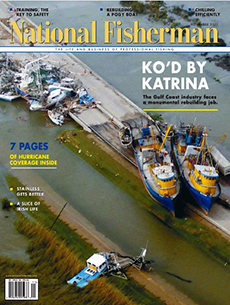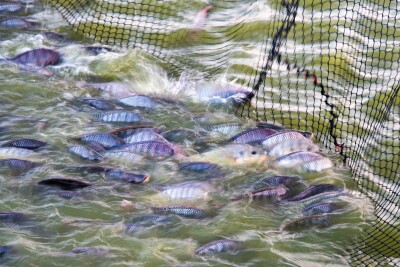On Aug. 29, 2005, Hurricane Katrina devastated the Gulf Coast.
It was the costliest natural disaster on record, causing an estimated $108 billion in damages, and was one of the top deadliest hurricanes in the history of the United States, causing at least 1,245 fatalities.
In 2005, National Fisherman covered the aftermath of Hurricane Katrina and spoke with fishermen who were fighting for their industry.“I have sunk in boats before with 80, 90 mile-per-hour winds, I never had to fight like I had to fight this,” said veteran New Orleans fisherman Pete Gerica in the November 2005 issue of National Fisherman. Gerica was in his home when the hurricane destroyed it. He towed his family through the flood and climbed into trees nearby where they remained for seven hours before being rescued.
Days after the hurricane hit, the Department of Commerce declared the entire Gulf of Mexico to be a fishery failure. Each gulf state lost millions of harvest dollars and only a fraction commercial fishery facilities were fully operational in the following years.
Fishermen were immediately concerned for the future and started to hatch a game plan.
“It’s going to take some time to piece it all together; we’ve got our work cut out for us,” said Ewell Smith, the director of the Louisiana Seafood Promotion and Marketing Board, in that same issue.
The industry was ready to fight for their place in the market, while consumers were turning away.
“We are still begging American people to eat American wild-caught shrimp. Our industry is on its knees and we need the American people to help us,” said Robert J. Samanie, a Louisiana shrimp processor and member of the Louisiana Wildlife and Fisheries Commission.
With the deck stacked against them, fishermen and processors were still optimistic.
“The strength of the commercial fishermen in the United States is more strong than a hurricane or foreign imports,” said Samanie. “Make sure people know we’re down, but we’re not out.”
As soon as business started to pick back up, many of those same fisheries were affected by the Deepwater Horizon oil spill, which spewed 210 million gallons of oil into the water.
In an area that some were starting to think must be cursed, fishermen began to rebuild their lives and once again got back to the water against all odds. They rebuilt their homes, boats, docks and facilities, getting back to what they do best as soon as they could.
Unfortunately, while fishermen were recovering, their markets were being slammed with a continuous flood of cheap imports. Now, 10 years after most people would’ve given up, fishermen are still at work.
We’re proud of the men and women who have stayed the course against all odds to continue providing quality gulf seafood from boat to throat.







